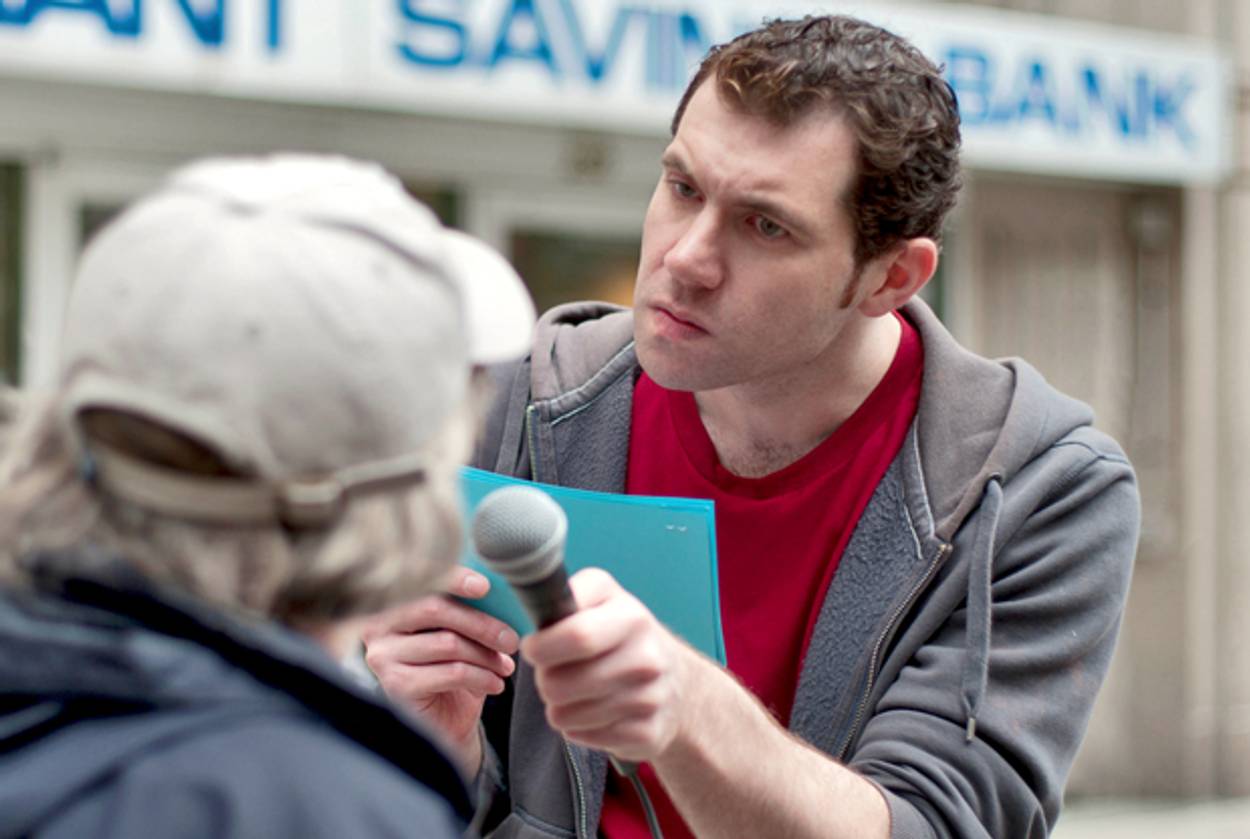Billy Eichner’s Brand of Jewish Comedy
Billy on the Street is in-your-face, outrageous, and completely brilliant




When I discovered Billy Eichner’s show Billy on the Street earlier this year, I was elated. Here was not just a Jew, but a gay Jew, being totally in-your-face and outrageous and completely brilliant. Watching him felt like breathing in a blast of super cold, bracing air.
For those who haven’t seen Billy on the Street, which airs on The Fuse Network, the comedian skitters around Manhattan, collaring passersby and sticking a mic in their gobsmacked faces as he fires nonsense game-show-style pop culture questions at them, faster and with more urgency than bullets from a Gatling gun. This situation gives viewers the kind of giddy anxiety one gets while watching any improv situation. But something about his character’s maniacal intrusiveness and sheer disregard for social convention signals that he’s more than just another funny act; in fact, something closer to a profound and transformative paradigm shift in Jewish male comedy.
Who are our favorite Jewish comics and comedic writers? Carl Reiner, Sid Caesar, Jackie Mason, Woody, Gilda Radner, Seinfeld, Phyllis Diller, Joan Rivers, Sarah Silverman. It’s an enormous list. A splendid, kvell-worthy list. And yet in Billy Eichner we have someone who breaks away from the old trope of the outsider delivering sardonic observations; here we have not someone who sits back and comments, but davka a guy who darts about in public, accosting innocent people, mocking them so breathlessly that he doesn’t have time to veer into actual offense. The energy is too brisk to really hurt anyone’s feelings or make them look deeply stupid. The humor’s not arch or even withering: neither Jon Stewart nor Howard Stern.
Of course it’s a very NYC schtick. For every three or so shocked-and-willing participants, Eichner encounters at least one unfazed, seen-it-all New Yorker. As a transplant from Indiana, I have tried to explain to the folks back home the gestalt of the City, how, at its best, it’s like a sometime-obnoxious big brother who pokes you repeatedly in the chest, or punches you in the arm, going, “Hey, hey, whaddya doin’?” forever. It’s annoying and endearing and anything but indifferent. It’s “Who’s better than me?”
As long as Billy Eichner is around, no one. Billy on the Street is a triumph of Jewish wit, strength, and I would argue existential health. Here’s this big gay guy not telling Jewish jokes or gay jokes, but careening around town poking people hard and just as quickly dismissing them (that’s the part I love best) with the exasperated “No!!” of a precocious toddler. He rejects contestants for good reason or for no reason and then storms off again (sometimes not even breaking stride) before an eye can blink or a heart can take another beat.
Lenny Bruce, Andy Kaufman, Paul Reubens: all of them mavericks, but none with this combination of exuberance, confidence, and brash indifference. This is lightyears away from “Have you ever noticed how …?” This is comedy by a Jew who really honestly does not care what you think, and why should he? Why did we ever? (He got their attention, too: A new comedy series written by, and starring, Eichner and Julie Klausner just got greenlit for Hulu.)
One of the many, many comments on an old Billy on the Street YouTube video reads, “This video makes me still want to be alive.” If you tack on at the end, “and a Jew,” then you’ll get exactly how I feel.
Previous: Drew Barrymore Loves Rosh Hashanah
Siân Gibby holds the position of writer/editor at the John D. Calandra Italian American Institute. She is the translator of Intimate History of the Great War, by Quinto Antonelli; The God of New York, by Luigi Fontanella; and Resistance Rap, by Francesco Carlo.